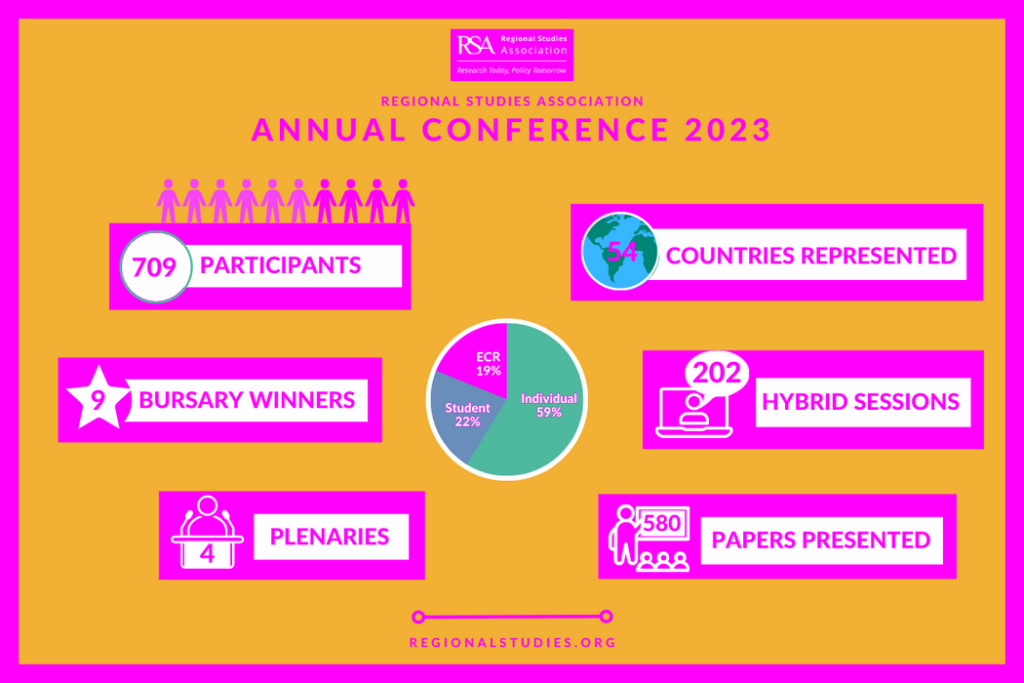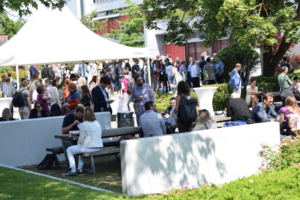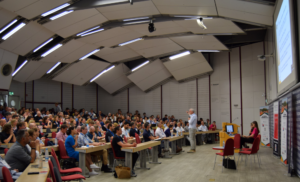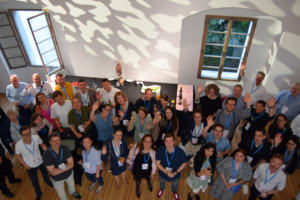Date and time
Conference Statistics:

The Regional Studies Association’s Annual Conference #RSA23 was our largest knowledge exchange and networking gathering in 2023. Organised in partnership with the School of Economics and Business, University of Ljubljana and the Slovenian Ministry of Cohesion and Regional Development, the conference was held at the School of Economics and Business, University of Ljubljana.
The four-day conference was run hybrid and brought together academics and policymakers to exchange news, views and research findings from the fields of regional studies and science, regional and economic development, policy and planning. There was representation from 54 different global territories as we gathered both established experts and early career researchers in the beautiful city of Ljubljana.
The conference featured 500+ presentations, high-profile plenary speakers, a number of specially convened sessions, workshops, networking sessions, walking tours and field trips. The social programme included the conference dinner and a welcome reception, side events, sport activities, exhibitor stalls and post-conference tours to explore Slovenia.
#RSA23 addressed topics concerned with regional and urban development, policy and research. The Association takes a broad view of its remit, but all submissions were refereed prior to acceptance to ensure minimum standards of quality and field relevance and innovation are maintained. In addition to abstract submissions we welcomed proposals for special sessions, networking events, book launches, author meets critic sessions, etc
Impressions and Feedback from Annual Conference 2023
Thanks to all organizers and participants of the #RSA23 in Ljubljana! Enjoyed all sessions – esp the ppt karaoke session – and the tight-knit regional studies community! (Heike Mayer, via Twitter)
“Let me congratulate you on organising the conference. It has been a great pleasure to present the results of the MeRSA grant and meet several colleagues there” (Jon Mikel Zabala-Iturriagagoitia, via email)
“Thank you again for the impeccable organization of the RSA Conference” (Dima Yankova, via email)
“It was nice and constructive that I participated virtually in the 2023 RSA Annual Conference, thank you and your colleagues for your support and services! I hope to have the opportunity in the future to physically attend in the conference.” (Dimitrios Tsiotas, via email)
“Thank you for the excellent organization, these days have been very enjoyable.” (Filippo Berti Mecocci, via email)
“Thanks again for the great conference! I think it was incredibly well organized and I had a lot of fun participating.” (Chris Brück via email)
“The RSA 23 conference was such a great pleasure! I would like to thank you and the Regional Studies Association for organising it and giving us all the opportunity to meet and exchange ideas in a thriving environment.” (Anna Butzin via email)
“Congratulations on the Ljubljana event. It was amazing and I believe it was a huge success”. (Marjan Nikolov, via email)
“My experience at the RSA annual congress in Ljubljana was brief but very intense. In only one day, I acted as chair in one session, participated in the ambassadors meeting, collaborated in the presentation of the journal Spatial Economic Analysis, of which I am a co-editor, and presented my own work in another session. In all cases, the attendees were very active and participative. In addition, I was able to reconnect with friends I had not seen since before the pandemic and, of course, I made new friends. It was an unforgettable experience, in a setting – the old town of Ljubljana – that could be described as a “fairytale”. Thanks to the organisers for their efforts!” (Coro Chasco via email)
“I just wanted to say thank you for hosting us at the RSA annual conference in Ljubljana the week before last. It was a thoroughly enjoyable few days, always a pleasure to attend an RSA event but this one did have a special feel to it, I think the word you used in your email earlier Nicki, joyful, was spot on. So many of the delegates I spoke to commented on how well organised everything was, how much they were getting out of it and not least how much they were enjoying themselves.” (Katy Crossan, via email)
“I really enjoyed the conference. Besides attending a conference in person post-Covid, I got to learn many new concepts and ideas, including the opening and closing plenary session” (Chandrima Mukhopadhyay, via email)
“Let me thank the RSA again for this bursary; it was an honour to receive, and it was such a rewarding experience to attend the conference in Ljubljana. Please do pass on my thanks and appreciation to the whole RSA team, who did a superb job at organising the conference so professionally. The conference was a really well organised, friendly, and supportive one—and the team has done an excellent job in making it so. I’ve organised a much, much smaller conference than this before, and I can only imagine the hard work, attention to detail, and dedication it must take to organise one as impressive as the RSA. Well done.” (Luke Green, via email)



Franziska Sielker and Johannes Suitner at the RSA Annual Conference – Click here to read their review
Regions e-zine Issue 16: Special RSA Highlights: Regional Studies Association’s Annual Conference #RSA23.
Below are links to the individual articles within the Regions e-zine.
INTRODUCTION: 2023 RSA ANNUAL CONFERENCE
By Harry Radzuan (email).
https://regions.regionalstudies.org/ezine/article/rsa-23-introduction/
REGIONAL INNOVATION AND TECHNOLOGICAL CHANGE
By Simone Grabner (email).
https://regions.regionalstudies.org/ezine/article/regional-innovation/
FINANCING REGIONAL TRANSFORMATIONS
By Luke Green (email).
https://regions.regionalstudies.org/ezine/article/financing-transformations/
SUSTAINABLE TOURISM
By Mariia Rastvorova (email).
https://regions.regionalstudies.org/ezine/article/sustainable-tourism/
GLOBALIZATION AND DE-GLOBALIZATION
By Carolina Guevara-Rosero (email).
https://regions.regionalstudies.org/ezine/article/globalization-de-globalization/
REGIONAL RESILIENCE
By Chandrima Mukhopadhyay (email).
https://regions.regionalstudies.org/ezine/article/regional-resilience/
GLOBAL CHALLENGES
By Sergio Palomeque (email).
https://regions.regionalstudies.org/ezine/article/global-challenges/
INCLUSIVE GROWTH
By Vojtěch Dvořák (email).
https://regions.regionalstudies.org/ezine/article/inclusive-growth/
URBAN AND RURAL TRANSFORMATIONS FOR SUSTAINABILITY AND RESILIENCE (JRC’S SMARTER CONFERENCE STREAM)
By Solomiia Tkach (email).
https://regions.regionalstudies.org/ezine/article/transformations-for-sustainability/
CONCLUSION: 2023 RSA ANNUAL CONFERENCE
By Sila Ceren Varis Husar (email)
https://regions.regionalstudies.org/ezine/article/conclusion-2023-rsa/